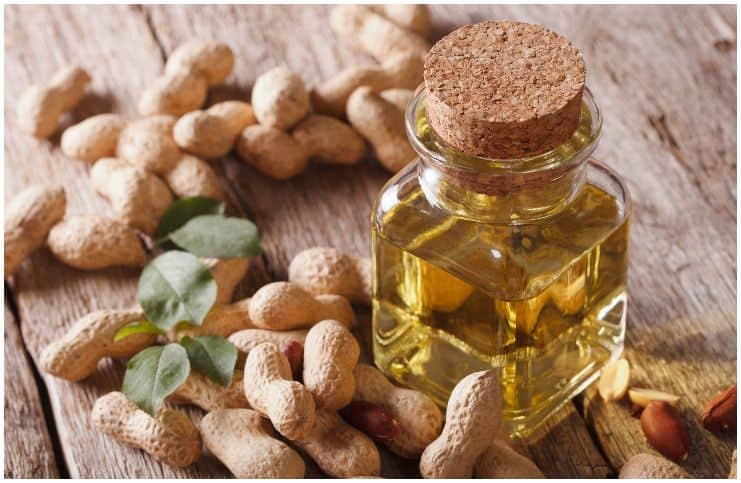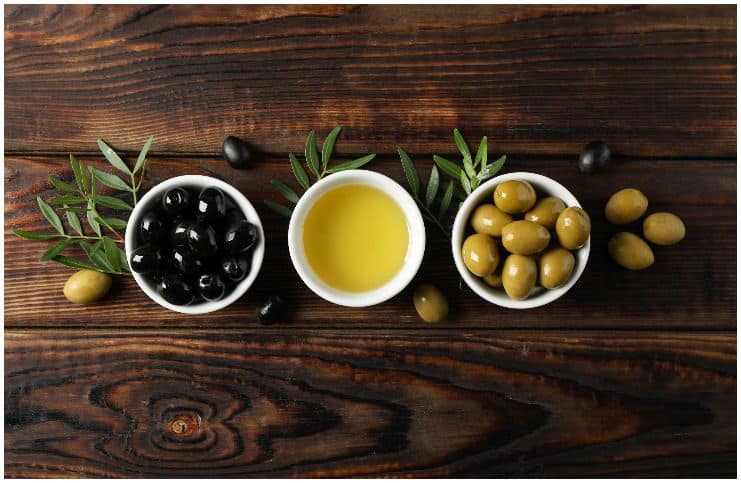Peanut oil, also called groundnut oil, is a type of vegetable oil that is derived from peanuts. Despite the word “nut” in its name, as a matter of fact, peanut is a legume, belonging to the family of Fabaceae (Leguminosae) and is originated from Central America.
It’s not as popular as almond oil or olive oil but is a good choice for healthier frying because it can withstand higher temperatures.
Health Benefits
A Good Source of Vitamin E
Vitamin E is a fat-soluble vitamin that plays a major role in human health. It has a protective function against toxins such as air pollution, eye disorders (especially cataracts), premenstrual syndrome, type 2 Diabetes Mellitus, and neurodegenerative disorders, like Alzheimer’s disease.
One tablespoon of this oil has more than 2 milligrams of vitamin E, which is approximately 15% of your daily recommended value.
Heart Health
According to the American Heart Association, this oil is rich in MUFAs – monounsaturated fatty acids which increase HDL cholesterol and lower LDL cholesterol. Furthermore, consuming more monounsaturated fats than saturated or trans fats is good for mental health.
It also contains resveratrol which is a special type of antioxidant, named a phytoalexin. Resveratrol was first isolated in 1940 and promotes improved insulin sensitivity and plays a vital role in the internal regulation of the cellular life spans.
This oil also contains linoleic acid that brings numerous essential body functions, such as – dilation and contraction of blood vessels and muscles, strong anti-inflammatory properties, and bone-building benefits.
Weight Loss
Recent research has concluded that substituting monounsaturated fats (MUFAs) for polyunsaturated fats and trans fats can lead to a healthy weight loss.
Perfect For Your Skin
It may be used as a massage oil for skin and is beneficial for relieving arthritic pain in joints. Moreover, it regenerates hair which has been damaged.
Best Substitute for Peanut Oil
In Salad Dressing
The best option is extra virgin olive oil. Olives are loaded with free radical-zapping antioxidants and with other many healthy macronutrients.
Furthermore, olive oil contains biophenols that suppress the oxidization of LDL cholesterol which is positively associated with the development of the cardiovascular disease. It is also a good source of tyrosol phenolic substances, like oleocanthal and oleuropein.
For Frying
Because some individuals are allergic to this oil, some good substitutes include:
- almond oil – extracted from raw almonds, it is rich in monounsaturated fatty acids, vitamin E, zinc and potassium, proteins, and lowers LDL (“bad” cholesterol), raises HDL cholesterol (known as “good” cholesterol) and generally lowers total cholesterol levels naturally.
- soybean oil – extracted from soybean seeds, this oil has the capacity to lower your LDL cholesterol, protect your heart health (due to its high content in polyunsaturated fat), reduce neurodegenerative diseases, such as Alzheimer’s disease, and boost your immune system. In addition, it has a long shelf life and is very stable in cooking.
- corn oil – obtained from the germ of corn, it is good for people with high bad cholesterol. For instance, it has four times more cholesterol-blocking plant compounds than olive essential oil. When shopping for this type of oil, look for GMO-free corn oil.
- safflower oil – it lowers the risks for heart disease by preventing the hardening of the arteries or atherosclerosis. Additionally, it is a storehouse of oleic acid (a natural fatty acid) which is very helpful for the health of the hair and scalp.
- grapeseed oil – extracted from the seeds of grapes, this oil maintains its healthy properties known to fight cancers at high temperatures. Moreover, it contains linoleic acid which improves the overall quality of your skin and enhances the cell membranes.
- avocado oil – produced from the fruit (avocado), it has many benefits (especially high concentration of beta-sitosterol), largely related to its content of healthy fats and antioxidants.
- canola oil – produced from crushed canola seeds, it contains a combination of monounsaturated, polyunsaturated, and saturated fatty acids. Remember to buy GMO-free because about 90 percent of the world’s canola crop is presently genetically modified.
- rice bran oil – made from the inner husk and germ of rice, it has an optimum balance of monounsaturated fats (MUFA) and polyunsaturated fats (PUFA) and it has a high content in tocotrienols and oryzanol (that can have a strong effect on the health of the physical body).
- macadamia nut oil – it contains oleic acid and squalene which facilitate cell regeneration.
- coconut oil – it has been known to heal kidney and urinary infections and can also be very protective against hair damage.
Avoid Completely
- butter – it is a rich source of saturated fats that raise the level of LDL cholesterol in your blood and adversely affect the heart. By limiting your saturated fat consumption to recommended amounts (better to zero), you’ll considerably lower your chronic disease risks.
- margarine – according to studies, the trans-fats found margarine increases the risk of death by 34% due to the fact that trans-fats are associated with an increased risk of heart disease. More importantly, it has a bad Omega-6 to Omega-3 fatty acids ratio because of its ingredients.
Note
Since all oils contain fat, use them sparingly.
References https://www.ncbi.nlm.nih.gov/pubmed/11558642 http://jrnlappliedresearch.com/articles/Vol8Iss3/216-225_SalesVol8No3.pdf https://ec.europa.eu/health/scientific_committees//docs/sccs_o_155.pdf





